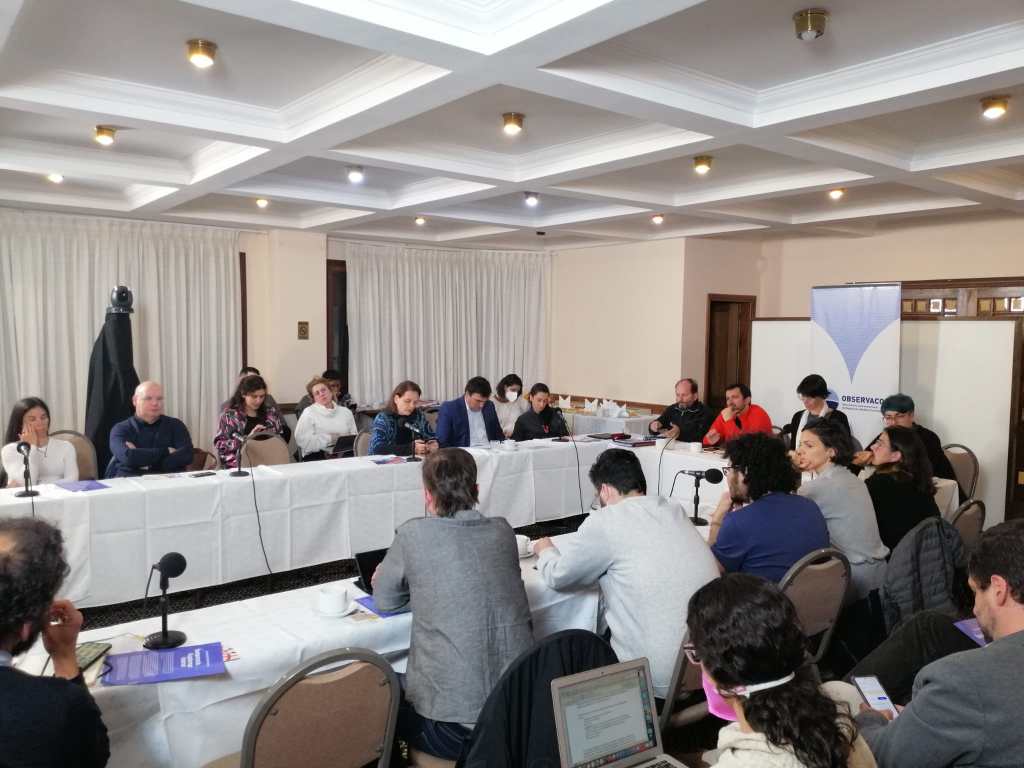
On 1 May 2022, World Press Freedom Day, the Wikimedia Foundation and Observatorio Latinoamericano de Regulación, Medios y Convergencia (OBSERVACOM) organized an open debate in Punta del Este, Uruguay. Doing so was part of our efforts to support events for digital rights activists, who advocate for policies and regulations that promote human rights on the internet. Entitled More Transparency in Content Moderation: How Do We Achieve It?, the open discussion brought together representatives of civil society and experts from the Latin American and Caribbean region to address the need for greater transparency of content moderation decisions by internet platforms. For the Wikimedia Foundation, this is a crucial issue, as transparency is a necessary tool to promote and protect the values of free knowledge and freedom of expression that guide our projects.
The participants, who attended both in-person and online, shared ideas and visions to effectively reach such transparency, exploring the functions and region-specific characteristics of potential governance models. They discussed and agreed on the need to take a proactive approach, which included presenting proposals for democratic regulation of transparency and accountability of large commercial platforms. Regulatory pathways taken elsewhere, such as the European Union’s Digital Service Act (DSA), were cited as inspiration for the region, where legislative discussions not only have lacked open and inclusive processes of public deliberation, but also where a human rights approach to regulatory proposals has been met with hostility. Within Latin America and the Caribbean, there is a diversity of forces and interests—including political, commercial, and social interests—at play in regulatory debates.
One of the most engaging—and revealing—issues discussed was whether countries in the region have the necessary institutional framework to oversee the eventual transparency obligations of large commercial platforms. Although this topic was particularly challenging, participants offered several ideas. For example, a researcher at the Institute of Digital Development for Latin America and the Caribbean (IDD LAC) observed that a potential pathway could be one that takes advantage of existing institutions such as the ombudsperson for children, consumers or audiences, as well as data protection authorities, so that these can be tasked to carry out such oversight. OBSERVACOM also invited participants to think about adopting models similar to those implemented by national health institutes in the region, which have made the studies and analyses of their counterparts in the United States and Canada the starting points for their own—hence benefiting from the fact that the latter generally have more capacity and resources.
There was a consensus among the participants that regulatory measures to be adopted should be applied with caution and balance, recognizing the variety of stakeholders that exist in the digital ecosystem. To provide further food for thought, representatives of Brazilian civil society presented on the lawmaking process underlying Bill 2630 on Freedom, Responsibility, and Transparency on the Internet, which includes a series of transparency obligations on advertising, operation, and content moderation of large commercial platforms. This process shows how, despite broad consensus among all stakeholders in Brazil that regulation is necessary and expected, there can be a clash of political forces and interests throughout the legislative discussion. Yet, there are high expectations that this process and proposal will establish a good transparency standard for the region. However, given the competing interests at stake, the final resolution of this process remains to be seen.
In conclusion, the participants concurred that it is fair to say that a regulation claiming to be democratic must be built by listening to and considering the different voices involved in the discussion. In addition, such regulation must aim to foster a vibrant digital citizenry and an environment in which human rights can thrive both online and offline. For that reason, we are pleased to contribute toward generating spaces for open and inclusive public deliberation about an internet that is participatory and equitable, and are ready to continue supporting and being part of that dialogue in the Latin America and the Caribbean region and elsewhere.

Can you help us translate this article?
In order for this article to reach as many people as possible we would like your help. Can you translate this article to get the message out?
Start translation